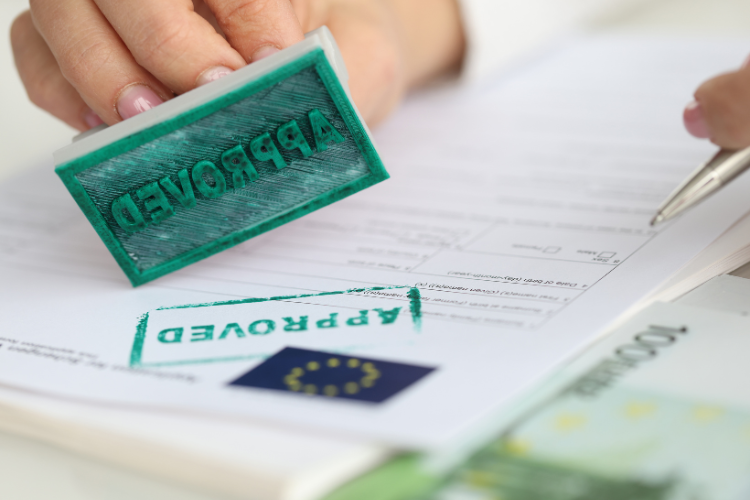Last Updated on November 1, 2024 by Maryam Siddiqui
Relocating to Europe is a relatively simple process if your spouse is an EU national. The conventional route to apply for a Work Visa, a Retirement Visa, and such, does not apply. Your EU-national spouse has the benefit of helping you qualify for an EU Spouse Visa. This visa grants the right to live and work in the EU, making it easier for families to reunite and settle in one place.

If you want to move to Spain or Portugal and your spouse is an EU national, this guide will help you through the process. Like any other visa application, there are specific requirements you will need to comply with.
The most basic requirements are proof of marriage and sufficient financial resources. But there’s a lot more you should know before you decide to go ahead with the final relocation. It’s also important to be mindful that each EU country might have a different process. Continue reading to learn more!
How can you move to the EU if your spouse is an EU Citizen?
If your EU-national spouse wants to return to their roots and settle in their home country or somewhere else in the EU, the relocation process is slightly different.
As a non-EU national married to an EU citizen, you have the right to join your spouse in any EU country where they live or plan to reside. This process falls under “Family Reunification” rights.
The EU national spouse does not need a visa to live in the EU country, but they do need to register their residency within 90 days of arriving. This is the basic requirement to proceed with the family reunification process.
Depending on the non-EU spouse’s nationality, they will need a short-stay Schengen Visa to enter the country legally. Then, the EU national spouse can proceed with the family reunification process.
This may include an interview or in-person submission, where you will present proof of your relationship and intentions to join your spouse. Once approved, you will typically be granted temporary residence, allowing you to live in the EU long-term.
If it’s Spain, you must apply for the Residence Card for Family Members of EU Citizens within three months. This will be your legal residency proof. In Portugal, you apply for a residence card called the Cartão de Residência at the local AIMA office within 3 months.
Both countries require you to periodically renew the residence card, which initially lasts for five years.
Who qualifies for the EU Spouse Visa?
To qualify for the EU Spouse Visa, you must meet the following criteria:
- The applicant must be a non-EU citizen.
- Be legally married to an EU citizen. Some countries may recognize civil partnerships or registered partnerships for this visa.
- Have proof of income and health insurance.
- Your spouse must be a resident of or planning to reside in an EU member state for you to be eligible to join them.
- If your spouse is an EU citizen in Spain, you are eligible for the EU Family Member Visa. Your spouse must either be living in Spain or moving there for work, study, or as a resident.
- If your EU spouse is in Portugal, you must apply for the EU Family Member Residence Card (Cartão de Residência).
Requirements for the Non-EU Spouse
Check out the list below:
- Portugal and Spain recognize both legal marriages and civil partnerships. You must provide a marriage or partnership certificate and proof that your spouse resides in Spain.
- Due to EU free movement rights, Portugal is relatively more lenient regarding financial requirements. Regardless, your spouse may need to demonstrate they have sufficient resources or are employed.
- Evidence of the relationship, such as joint bank accounts or shared assets, may be requested to prove the authenticity of your marriage.
- You may be asked to submit a clean criminal record certificate.
- A health certificate may be required to confirm you’re not suffering from any contagious disease.
Rights Granted Under the EU Spouse Visa
Under Family Reunification laws, the EU spouse visa allows non-EU spouses to reside legally in the EU country where their spouse is. After living in that country for a certain period, they may also have the right to move to another EU member state.
But of course, they’ll have to comply with local immigration laws. If you have a visa, you can travel within the Schengen Area for short stays of up to 90 days. You won’t need a separate visa for this.
You will also have access to public services, including healthcare, education, and social security benefits in the country. This access may vary based on local regulations and the specific entitlements the member state grants.
In Spain, you have the right to work without a separate work permit, but only after you get your Residence Card for Family Members of EU Citizens. Similarly, you can work in Portugal after you get your Residence Card. This card confirms your legal status as a family member of an EU citizen and allows you to access employment and other social benefits.
Application process for EU Spouse Visa
The process for the EU Spouse Visa involves gathering your marriage certificate and proof of your spouse’s EU citizenship and residency. Once you have everything ready, you’ll apply to the appropriate consulate or immigration office. Let’s go over the details!
Registering your marriage in the EU
In Portugal, you can register your marriage at the Civil Registry Office. You must register it in the municipality where you plan to reside. You’ll primarily need your original marriage certificate and identification documents. Your marriage certificate may need to be translated into Portuguese and legalized or apostilled.
Next up, visit the local Civil Registry Office, submit the documents and complete any required forms. The process is straightforward, and you may receive your marriage registration certificate on the same day.
For Spain, register your marriage at the Civil Registry in the municipality where you and your spouse reside. Make sure you go to the local registry office that deals with foreign marriages.
You’ll need your original marriage certificate, which must be officially translated into Spanish and legalized, and your identification documents. To obtain these, visit the Civil Registry, complete the application form, and submit the documents.

Visa Application Submission
Check out the steps below to apply for the EU Spouse Visa:
- Fill out the visa application form specific to the country where you are applying.
- Submit your application and the required documents. This can be done in person or online.
- You may be required to attend an interview at the consulate or immigration office. Be prepared to discuss your relationship and provide any additional information they may request.
- Sometimes, you may need to provide biometric data such as fingerprints and photographs as part of the application process.
- The processing time can vary, so check the specific timelines provided by the consulate or immigration authority.
- Once your application is approved, you will receive the visa. After arrival, you must apply for a residence card within 3 months.
- In Spain, you must register at the local Extranjería office, and in Portugal, at AIMA. This is to confirm your residency status and obtain your residence card.
Processing takes 1 to 3 months in Spain and 2 to 3 months in Portugal. However, it may vary based on the case’s complexity and local processing speeds.
Let’s Move to Europe
With Viv Europe your plans for Europe will come to a reality
Residency Permit
Once you arrive in Spain, you must apply for the Residence Card for Family Members of EU Citizens. This application must be submitted in person within three months of your arrival at the local immigration office or the police station.
You’ll need to provide the documents mentioned earlier. The initial card is typically valid for five years; you can renew it afterward.
In Portugal, you apply for the Residence Card at the AIMA office within 3 months. The application requires your visa, Passport, proof of marriage, spouse’s residency, and financial documentation. This permit grants you the right to live and work and is also only valid for five years with the option to renew.
Duration and Renewal of the EU Spouse Visa
For both Spain and Portugal, the initial residence permit is valid for five years, after which you can renew it. Apply for the renewal before the card expires. You must provide updated proof of your marriage, your spouse’s residency, and other supporting documents like financial means and health insurance.
If you want to transition to permanent residency, you’ll have to live in either country for a continuous 5 years. You’ll need your valid residence card, proof of 5-year residence through rental agreements, utility bills etc, and proof of continued marriage to your EU spouse.
Permanent residency gives you an indefinite stay and further rights of enhanced access to work and public services. In Spain, after 10 years of legal residence, you will be eligible to apply for citizenship. You can apply for citizenship in Portugal after 5 years of legal residence.
Working and Studying in the EU as a Non-EU Spouse
Once you get your EU Spouse Visa and your residence permit, you have the right to work in the EU country where your spouse resides. You don’t need to apply for a separate work permit. This applies to both employment and self-employment.
Non-EU spouses can also study in the EU country where they reside. You will have the same access to educational institutions as citizens, which means you can enroll in universities, schools, or training programs without additional restrictions. Sometimes, you may even qualify for scholarships or tuition discounts, depending on local regulations and residency duration.

- Interested in studying abroad? Check out our article on Everything You Need To Know To Study In Portugal.
Tax Obligations For Non-EU Spouse
As a legal resident, you will have to follow the same tax obligations. You must file taxes on income earned within the country, including employment or self-employment. Depending on local tax laws, you may also be required to report any foreign income.
Sometimes, tax benefits or deductions may be available to you if you are part of a household with an EU citizen spouse, including options for joint filing. It’s recommended to consult local tax authorities or a tax professional for specific guidance based on your residency and financial situation.
- Read more about the Portugal Tax System: Easy Breakdown For Expats.
Common Challenges
Like all other relocation technicalities, moving to the EU if your spouse is an EU citizen can have its challenges.
One of the biggest challenges in getting the visa is gathering and legalizing the required documents, such as marriage certificates and their translations. This can be time-consuming and slightly costly. The visa applications can take several months, leading to delays in relocating and joining your spouse.
Additionally, authorities may ask for substantial evidence of the relationship, like interviews, photos, or joint financial records. It can be challenging to compile this if you and your spouse have lived apart for some time.
While the process for the EU Spouse Visa can be demanding, staying organized with the specific country’s requirements can help. Alongside the challenges, the visa does make the path to joining your spouse smoother and more manageable. It all pays off in the end!
Do you want to live in the EU with your spouse?
The process can seem long and draining – it’s definitely not easy to live apart from your better half for so long. But it is well worth the wait.
Having all the information gathered in one place is just half of the work; the other half is doing things right. If you feel stuck at any stage during the process, feel free to reach out to Viv Europe’s experts to complete your application successfully!
From visa guidance and translation of documents, to finding a property and helping you settle in, we’re here to help every step of the way!





